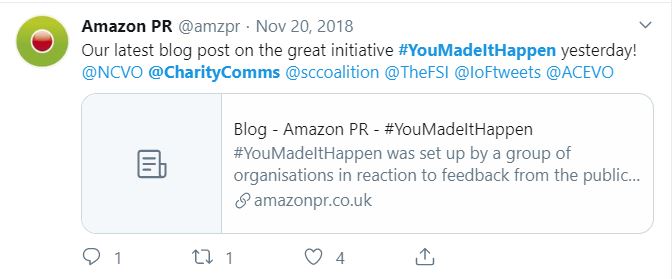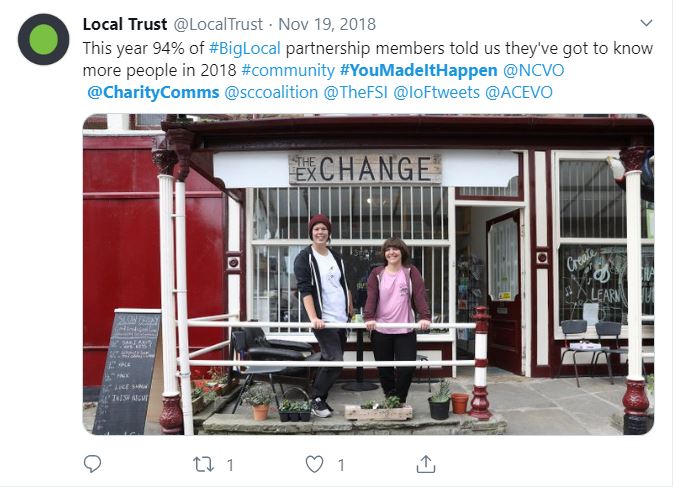Annual Report 2019

Highlights and activities
Our key achievements and challenges over the past year, plus the CharityComms statement of accounts for 2018-2019

Sarah Clarke
Author
Sarah Clarke is Head of membership at CharityComms, looking after all things membership as well as overseeing digital and data projects.
Contents
1. Welcome
2. Objectives and activities
3. Public benefit
4. Charitable purpose
5. Business plan: 1 May 2018 – 30 April 2019
6. Membership
7. Mentoring scheme
8. Events
9. Digital communications
10. Best practice guides, reports and resources
11. AskCharity
12. Digital Benchmark
13. Building trust in charities
14. Report of the trustees
15. Development activities 2019 – 2020
Section 1
Welcome
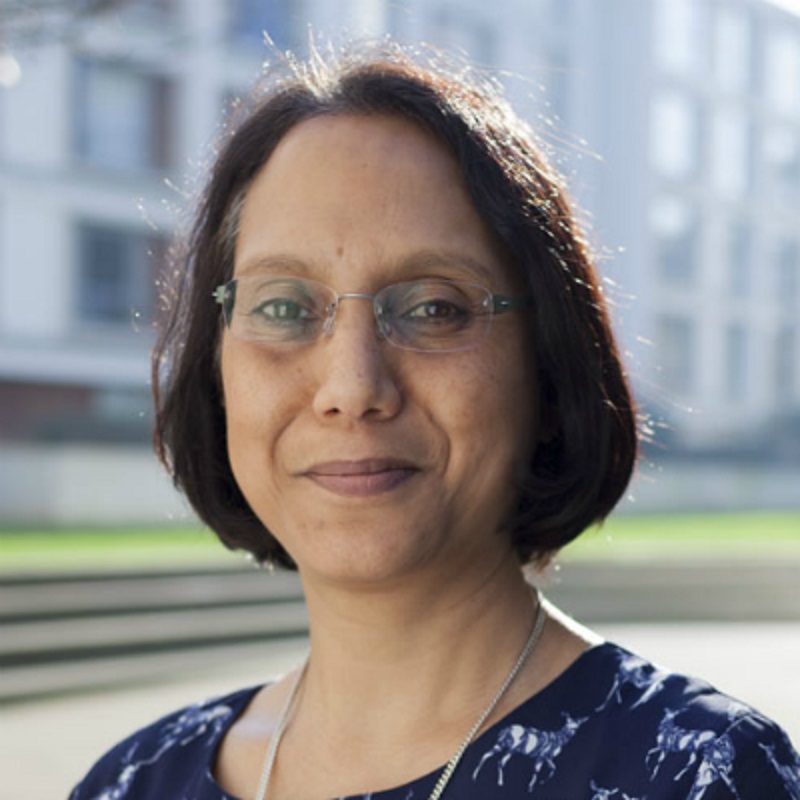
Adeela Warley
CEO at CharityComms
Adeela joined us as CEO in Feb 2017, having previously been a CharityComms trustee and Head of communications at Friends of the Earth.

Mark Russell
Chair of Trustees at CharityComms
Mark was appointed as CharityComms Chair in March 2019 and has previously been Chair of the Cleft Lip and Palate Association.
Inspiring and championing great communications
Our focus during 2018 – 2019 has been on inspiring great communications, supporting skills and career development, improving the membership experience and empowering our peer to peer community to connect with and learn from each other.
Working alongside you
Charity communicators are on the frontline, helping charities steer their way through a volatile, and complex world. Fragile public trust, rapidly changing technology, shifting demographics and political uncertainty have made the need for outstanding communications even more vital.
It’s why CharityComms has been working alongside communicators to ensure they have the advice and tools they need to build strong and salient brands, to put audiences at the heart of what they do and to demonstrate the positive difference they make in the world.
We’re their first port of call and their champions.
Growing and investing
2018-19 has been a good year for CharityComms with a growth in all categories of membership, delivery of the biggest number of events ever, higher levels of face-to-face and online engagement and a new and improved portfolio of member benefits.
events
- income growth in 2018-19 20%
income (£)
The charity witnessed a growth in income of 20% in the year to £794,000 bouyed by increased membership subscriptions in all categories, increased attendances at events and a rising popularity of the Digital Benchmarking service. The continued growth in revenue has encouraged investment in our team, improved our processes and our services delivery.
This year we have also invested in governance, because we recognise good governance and effective charities go hand-in-hand. Working with specialist agency Leading Governance we completed a comprehensive review and agreed an action plan for continuous improvement and learning.
Making a positive impact
This Annual Report highlights key achievements and challenges over the past year and the positive experience our members have had both with CharityComms and as part of a thriving communications community. We are proud that the impact of our work not only increases the effectiveness of our members but makes a positive contribution to the sector as a whole.
Section 2
Objectives and activities
Our purpose and what we aim to achieve
Our vision
Our vision is for effective and inspiring communications to be at the heart of every charity’s work for a better world.
Our purpose
We improve the standard of communications and champion its role in the sector. We represent, support, inspire, connect and inform our members and the wider charity communications community.
Our goals by 2023
More and better resources will be available to help charity communicators improve their skills and the impact of their work.
Communications will be recognised across the sector as an integral part of the effectiveness of charities.
Charities will have SMT/senior board representation from communications (i.e. an equal voice at the top table).
The planning and delivery of charities’ communications will take place in the context of an integrated brand and organisational framework.
CharityComms’ theory of change

communications create change
charities create change
charities that communicate better, create better change
Just some of the ways we help to create that change…
Knowledge Hub
Our main editorial offering and the place for articles, case studies and best practice guides. In headline terms we saw a 3.6% increase in audience figures across the website thanks to clocking up 165,295 users in 2018-2019 and over 615,000 pageviews.
“The mighty @CharityComms is of course THE organisation for… well, charity comms – and their Knowledge Hub reflects this perfectly. https://t.co/eRziJCyZqk” (via Twitter)

Dr Richard Berks
freelance science writer for medical research charities
Mentoring scheme
The matching service we run exclusively for our members to support their professional career development. The scheme continues to grow from strength to strength and in 2018 – 2019 we matched 197 people working in comms with a mentor, our most ever and almost three times as many as the previous year.
“It’s a great opportunity for personal growth, especially around managing people and relationships in your organisation. I think that the matching works really well.”
Events
Our events offer inspiration, best practice and support to communications professionals of varied seniority levels, comms specialisms and geographical locations. This year we ran 67 events (including seminars, conferences, special interest groups, UK-wide groups, workshops and networking events) attended by over 4,500 charity communications professionals.
“This was one of the most beneficial events I’ve been to in my time working in charity communications. I learnt practical tips, felt moved and inspired, and encouraged to drive forward stories in my own work. An absolutely exceptional event – I couldn’t rate CharityComms highly enough!”
Laura Mitchell
senior communications and marketing executive, St Catherine’s Hospice, at the power of human stories conference, Feb 2019
Section 3
Public benefit
How we deliver our services to members
The trustees confirm that they have complied with the requirement set out in the Charities (Accounts and Reports) Regulations 2008 to report on how they have carried out their charity’s purposes for the public benefit and have complied with their duty to have due regard to the Charity Commission’s public benefit guidance when exercising any powers or duties to which the guidance is relevant.
Optimising communications
CharityComms was established to promote the efficiency and effectiveness of charities, not-for-profit organisations and voluntary organisations for the benefit of the public throughout the UK by the provision of resources to optimise their communications.
CharityComms delivers public benefit by providing free or low-cost resources, skill and best practice sharing and training, all aimed at raising the standard of communications across the charity sector. The following summary of our significant activities demonstrates how we deliver both our mission and our public benefit.
“I’ve found membership of CharityComms invaluable and have met some very interesting people in the charity sector, as well as attended some inspiring talks and seminars along the way. It’s great having an organisation like CharityComms supporting me now that I am freelance.”

Sabeha Syed
freelance writer and editor
Section 4
Charitable purpose
How we work to raise the standard of communications
At CharityComms, our aim is to connect, inform, empower and inspire comms professionals in the charity sector. We’re working with our members and the wider communications community to raise the standard of communications in not-for-profits, to enable them to deliver their world-changing missions more effectively.
From our membership scheme and events to our best practice guides, reports, support for professional development and web and social media content, we aim to listen and respond to our members to deliver a service that meets their needs and exceeds their expectations.
connect
inform
empower
inspire
Section 5
Business Plan
1 May 2018 – 30 April 2019
External
Proactively sharing the benefits of membership and creating effective ways to retain existing members.
Increasing access to events and maximizing cross-channel content value (integrated content strategy).
Reviewing and improving our product portfolio to provide best value for existing and new members.
Internal
Embedding membership insight to support an audience-centric approach.
Ensuring our policies and practices are GDPR compliant and embrace the GDPR principles.
Streamlining administrative tasks to save time and money.
Creating capacity for testing and learning.
Fostering integrated ways of team working.
Accessing trustee expertise in a more focused way.
Section 6
Membership
At the heart of what we do

Sarah Clarke
Head of membership
Sarah is Head of membership at CharityComms, looking after all things membership as well as overseeing digital and data projects.
Championing the value of communication
Our members are at the very core of why we are here – not just as a professional membership organisation, but as a charity that champions the value of communication – and their enthusiasm for our events and activities and willingness to contribute ideas and feedback continued apace during 2018 – 2019.
Our range of membership benefits continues to support our member organisations of all sizes to train and empower their teams to deliver more effective communications in their everyday work.
Individual members
Our individual membership package has continued to offer a varied range of resources to freelancers or those working as part of a small comms team. Individual members grew to 424 during the year with our retention rate increasing to 69%.
Corporate partners
One third of our corporate partners have been with us for five years or more and we are delighted that our list of recommended suppliers remains steady at 100.
- 2018-2019 individual membership renewal rate 69%
# individual members
- # corporate partners who have been members for 5 or more years 33%
Jobs board
Activity on our jobs board increased by 26% with 796 jobs submitted during the year.
Organisational members
Renewal rates for organisational members increased by 4% to 93% with 60 new organisations joining us for the first time.
- activity increase on our jobs board 26%
new organisational members
- 2018-2019 organisational membership renewal rate 93%
AskCharity
The number of searches on AskCharity, our free service that matches charities with journalist requests, increased by more than 50% to 3,191.
Supplier directory
Page views for our supplier directory increased by 36% to just under 10,000 and over the next year we aim to build on that success and improve the functionality and effectiveness of our online directories.
- increase in AskCharity searches 50%
AskCharity searches
- increase in supplier directory page views 36%
“As an independent comms specialist, I have to think carefully about my budget, but my CharityComms membership is worth every penny. Crucially, being listed on the freelancers’ directory has led to a good volume of expressions of interest and confirmed client projects over the years.”

Sarah Browning
Internal Communications Specialist

Helping you make the most of membership
One of our focus areas for this year was to better communicate how everyone can make the most of their membership, whatever their job level or focus. This included more regular email communications so that everyone across an organisation is aware of their benefits and how to sign up to our email lists etc, as well as a series of videos for current and prospective members that highlight what we do and what we can offer, and welcome postcards and messages to new members to serve as a reminder of how to access their benefits and to say thank you for joining our community.
“Thanks for your lovely postcard! I’ve stuck it on our Board of Joy here in the office.”

Calum Walker
Communications Officer, Prisoners’ Education Trust
Section 7
Mentoring scheme
Offering peer support and career development
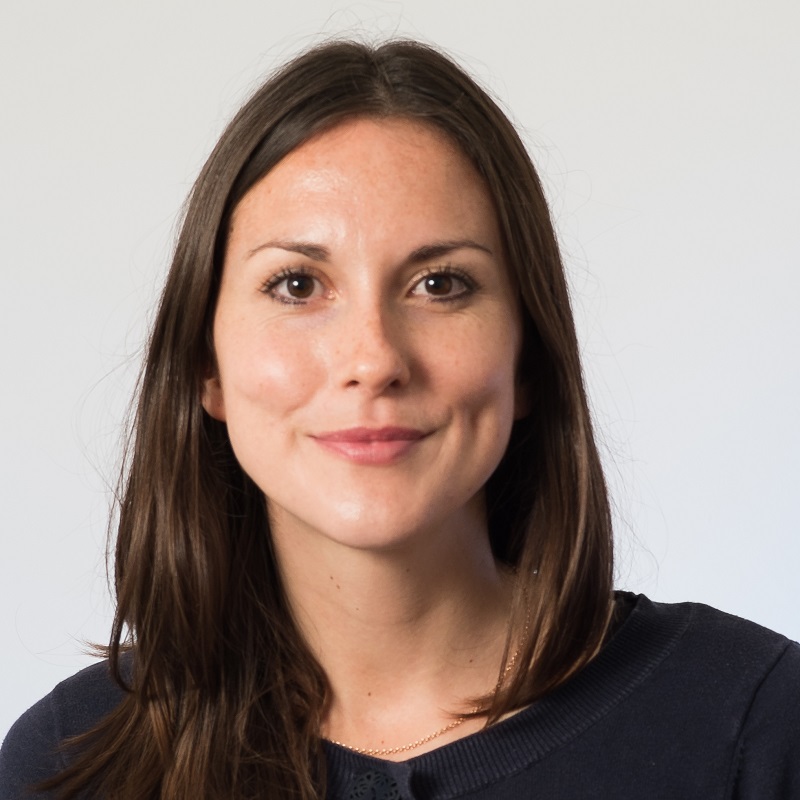
Lally Wentworth
Mentoring manager
Lally looks after our mentoring matching service, making sure that both mentors and mentees get the best experience from our scheme.
A unique matching service
Our Mentoring Scheme offers a unique personal matching service exclusively for those working at our member organisations and in 2018 – 2019 we made the most matches ever with 197 people paired with a mentor (up from 69 in 2017 – 2018) as well as 15 one-off meetings.
matches made
- 69 matches in 2017-2018
- 197 matches in 2018-2019
one-off meetings
Who applies for the scheme?
The scheme is most popular with officer level applicants (51%), quite closely followed by managers (36%).
The vast majority of applications are from our large charity organisational members (with an income of more than £10milion) who make up 55% of participants, with the next largest being from those in the £1-2 million income bracket at 14%.
While those working in digital / social media or media / PR teams are most likely to apply, at 29% and 24% respectively, we get a range of applications from across all comms disciplines, from marketing to campaigns.
- digital / social media 29%
- creative / editorial / film / brand / content 5%
- media / PR 24%
- fundraising 1%
- marketing 12%
- campaigns / policy / public affairs 11%
- membership 2%
- general comms 16%
“Getting a fresh perspective from someone with different experience in the sector. Being able to speak openly about ambitions and issues. Clear, actionable advice. I was lucky to have a great mentor who was clearly invested in my development and keen to give her time to me.”
Themes of mentoring objectives
This year, we have tried more strongly to encourage applicants to apply with a focussed objective which falls under clear themes. Career progression, specific comms challenges and people management are all common themes within applications.
- new role or promotion 18%
- specific comms challenge 26%
- combined new role and specific challenge 19%
- career progression 27%
- leadership or people management 9%
As always, we find that our mentors gain as much from their experience as those they are helping.
“Being able to be a mentor, rather than a manager, was really refreshing. I have developed my mentoring skills and have met a great contact in my mentee. It was great, I really enjoyed it.”
Section 8
Events
Inspiring, sharing and networking

Vanessa Weddell
Head of events
Vanessa is responsible for our events portfolio, overseeing more than 70 events each year.
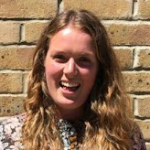
Sarah Cutress
Events officer
Sarah works on our networking group and special interest groups.

Emma Wickenden
Senior events producer
Emma gathers content and speakers for our major events, including our annual digital conference.

Lauren Haizel-Cobbina
Events and membership assistant
Lauren helps to organise and manage our events portfolio, working on logistics and communications.
Bringing our values to life
CharityComms’ events bring our mission to life by showcasing examples of innovation and best practice and allowing our network to share their successes, challenges, solutions and ideas with their peers.
We aim to inform, inspire and empower delegates to use effective communications to better serve their beneficiaries and supporters.
We are proud of our achievements this year and our events included seminars, conferences, special interest groups, UK-wide groups, workshops and networking events, attended by over 4,500 charity communications professionals.
events
attendees
“This was one of the most beneficial events I’ve been to in my time working in charity communications. I learnt practical tips, felt moved and inspired, and encouraged to drive forward stories in my own work. An absolutely exceptional event – I couldn’t rate CharityComms highly enough!”
Laura Mitchell
senior communications and marketing executive, St Catherine’s Hospice (after attending The power of human stories conference, Feb 2019)
Special interest groups
We continued to run our existing special interest groups for brand, PR and media, creative, internal comms, digital and campaigning professionals.
Enhancing new skills and knowledge
An impressive 97% of conference delegates and 94% of seminar delegates said they had acquired new knowledge or enhanced skills relevant to their job after attending a CharityComms event.
“It was a brilliant day, very well organised and professional. I always come back from CharityComms events feeling inspired and look forward to using what I learnt in my future projects. It is nice to be able to talk to other people in your sector that aren’t from your organisation to swap stories and skills.”
Hannah Woollven
Events and communications manager, Challengers (after attending the Psychology of communications conference, 28 June 2018)
Social Media Network
We also introduced a new special interest group called the Social Media Network. The group has been very popular and we ran four events for over 130 social media leads.
Presentation training
We introduced free presentations skills training for our conference speakers to improve the quality of the presentations and to support our speakers.
“The course was excellent. Not only did I get tips and build skills to help me be a better presenter, I got invaluable ideas and guidance on making my presentations themselves far more effective, inspiring and engaging.”
Hayley Tomkinson
Stories manager, Anthony Nolan (who spoke at the power of human stories conference, Feb 2019)
Our biggest ever conference
We ran our biggest digital conference to date with nearly 400 people in attendance – 98% of those attending said they’d gained new knowledge and skills from the day.
“It was sincerely, one of the best conferences I have been to. CharityComms staff were also really polite and helpful. I came away with a lot to think about, and a lot of information to take back to my team. I would be keen to return again next year.”
Paige Hughes
Marketing & Communications Manager, TLC: Talk, Listen, Change (after attending the Charity Digital Conference, Nov 2018)
New leadership courses
We introduced a new one-day leadership course for senior comms professionals called Hack Yourself: modern leadership for communicators. It received excellent feedback and we ran four sets of the course. We also introduced a junior level version of the course, running two sets of these.
“Inspirational” | “Revealing” | “Not your regular leadership course” | “Impactful” | “An experience you need to have rather than hear about” | “Eye-opening”
feedback from Hack Yourself: modern leadership for communicators
Thank you!
We’d like to say a special thanks to those members of our events team who have moved on during 2018 – 2019.

Harri Smith
former events manager
Harri was with CharityComms for more than five years and, as our events manager, she had overall responsibility for our full events portfolio. She is now Events manager at Pancreatic Cancer UK.

Robyn Lewes
former events officer
As events officer, Robyn played a vital role in managing our range of events each year, as well as working on our podcast. She is now Communications Assistant – Q at The Health Foundation.
Section 9
Digital communications
From inspiring case studies to new guides on innovation and film

Christine Fleming
Senior digital officer
Christine is responsible for managing our digital content across the website and social, as well as leading on digital development and projects.

Molly Clarke
Digital content officer
Molly is the digital content officer at CharityComms, leading on all of our social media, and a Charity Works fellow.
CharityComms continues to create valued and valuable free content to a rising number of readers via our website.
In the last six months of the year in particular there was a big push to deliver two new guides – one on innovation and one on film – boost traffic to the site through eNews and add even more value through our social media channels.
Increasing our content and viewer numbers
Users on www.charitycomms.org.uk rose by 3.6% from 159,538 last year to 165,295 in 2018-19.
We posted around 100 new articles – a mixture of thought-leadership pieces, inspiring case studies and practical top tips – on the site as well as two new long-form best practice guides in the second half of the year.
Knowledge Hub views
website users
Innovation guide views
In total the Knowledge Hub was viewed by 83,058 users over the course of the year and accounted for just over 30% of overall site traffic, with the first of our two new format best practice guides – the Innovation guide – generating 4,126 pageviews alone between its launch on March 28 until the end of year on April 30.
Growing our digital communities
In terms of our other digital communities, the subscriber numbers for our eNews mailout continued to remain high with 9,300 individuals signed up to eNews at the end of the year, and our Twitter following grew by 6.2% from 2017/18 to reach 42,166 by 30 April 2019 and generated nearly 19,500 pageviews for the CharityComms website.
Twitter followers
podcast listens
eNews subscribers
CharityComms podcast
The CharityComms pod-cast also continued to grow from strength to strength from May 2018 to April 2019 with 6 new episodes added and over 6,000 listens recorded over the course of the year.
Due to staff changes we are reviewing how best to deliver podcast activity and expect to publish more in the second half of 2019. So watch this space…!
Thank you!
We’d like to say thank you to Sushi, who left the CharityComms digital team during 2018 – 2019.

Susheila Juggapah
former digital content manager
Sushi was with CharityComms for more than three years and as digital content manager, she oversaw digital content and projects as well as working on the podcast. She is now working as Digital editor at The MDU.
Section 10
Best practice guides, reports and resources

Christine Fleming
Senior digital officer
Christine is responsible for managing our digital content across the website and social, as well as leading on digital development and projects.

Molly Clarke
Digital content officer
Molly is the digital content officer at CharityComms, leading on all of our social media, and a CharityWorks fellow.
Inspirational ideas and examples
CharityComms’ best practice guides contain inspirational ideas and examples of great comms work from across the sector.
Each guide is developed in partnership with members and experts from the sector which ensures the final product is representative of the spectrum of ideas, experiences and wisdom available. Guides are designed to help communicators build their skills and address key challenges. They are free to view on the CharityComms website. This year we have published two new digital resources:
Innovation Guide
Best Practice Guide to Innovation written by Alex Scott and sponsored by the creative agency Narrative, was published online 29 March 2019 generating 4,126 pageviews alone between its launch on March 28 until the end of year on April 30.
Film Kit
Film Kit – Making Films for Social Change, written by Molly Clarke, digital content officer at CharityComms, and freelance charity filmmaker Mike South, was published online on 26 April just before the end of this reporting year.
Looking ahead
We have continued to work on a second edition of our popular book, Make it Matter – creating communications strategies in the not-for-profit sector.
Working in partnership with Joe Barrell of Eden Stanley and convening a series of engagement workshops with communications specialists and gathering case studies from inside and outside the sector, publication is planned for Spring 2020.
Section 11
AskCharity
Connecting charities and journalists

Stacey Kelly-Maher
Digital projects officer
Stacey looks after our Digital Benchmark, supplier and freelance directories, AskCharity and jobs board, as well as working on special data projects such as our salary survey.
Making media connections
AskCharity is CharityComms’ free media matching service, designed to help charities and journalists work together. Journalists use it to find case studies, spokespeople and information from charities.
Charities use AskCharity to expand their media contact lists, develop relationships and achieve more (or broader) media coverage. This year 693 requests for information were sent by journalists to AskCharity registered charities and we welcomed 142 new charities to the service, growing the number of charity participants by to 5% 3,363.
new charities signed up
total charity participants
journalist requests
Section 12
Digital Benchmark
A unique collaboration helping charities improve their online performance

Stacey Kelly-Maher
Digital projects officer
Stacey looks after our Digital Benchmark, supplier and freelance directories, AskCharity and jobs board, as well as working on special data projects such as our salary survey.
Comparing and evaluating data
The CharityComms Digital Benchmark grew by 31% during 2018/19 to a group of 71 UK charities who pool their digital data in order to compare and evaluate their online performance.
A new version of the dashboard was launched to participants with improvements to usability, navigation and filtering as well as an overall move away from tables towards data visualisation with more streamlined charts and changes to highlighted metrics in line with Google Analytics’ increasing focus on users.
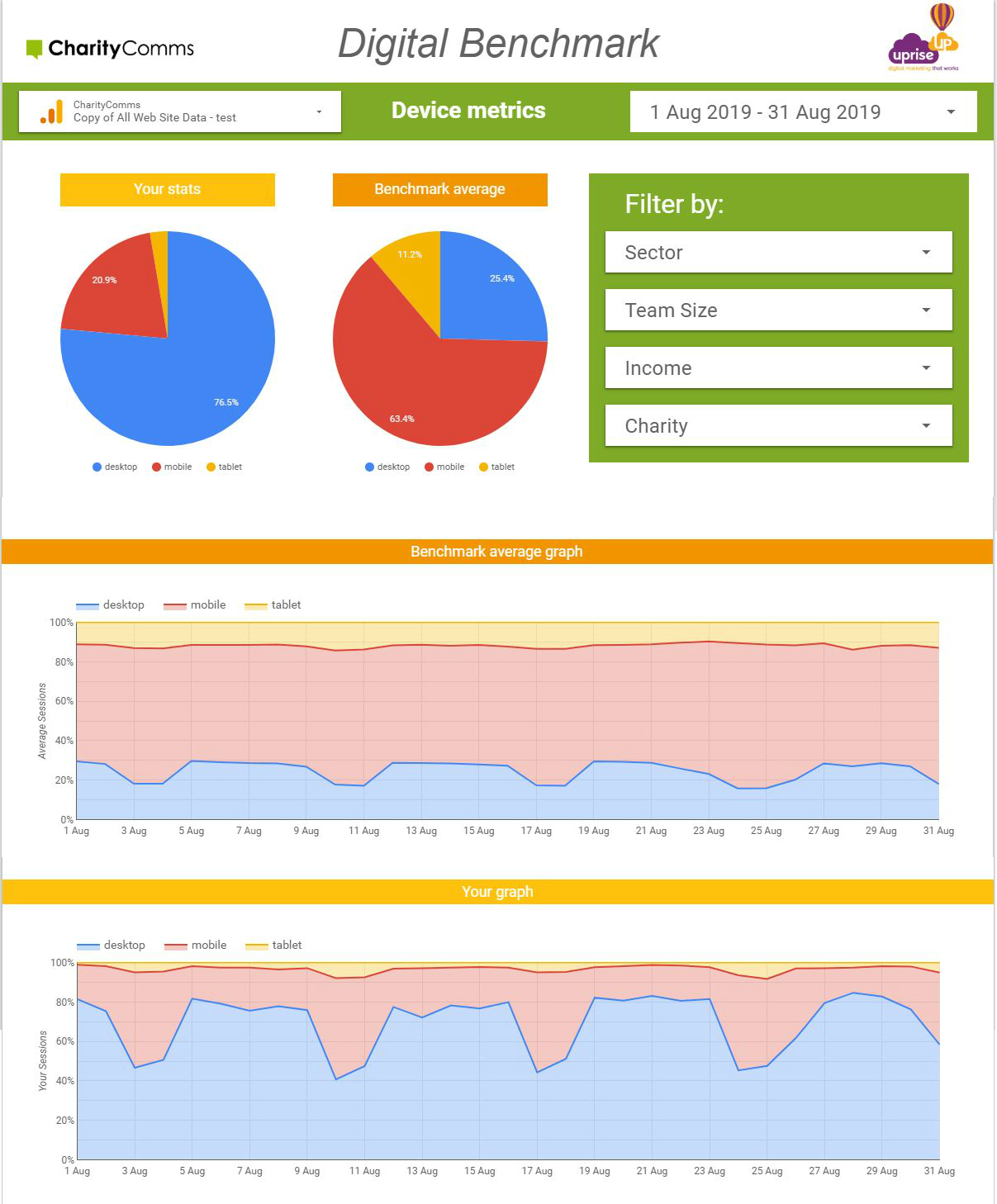
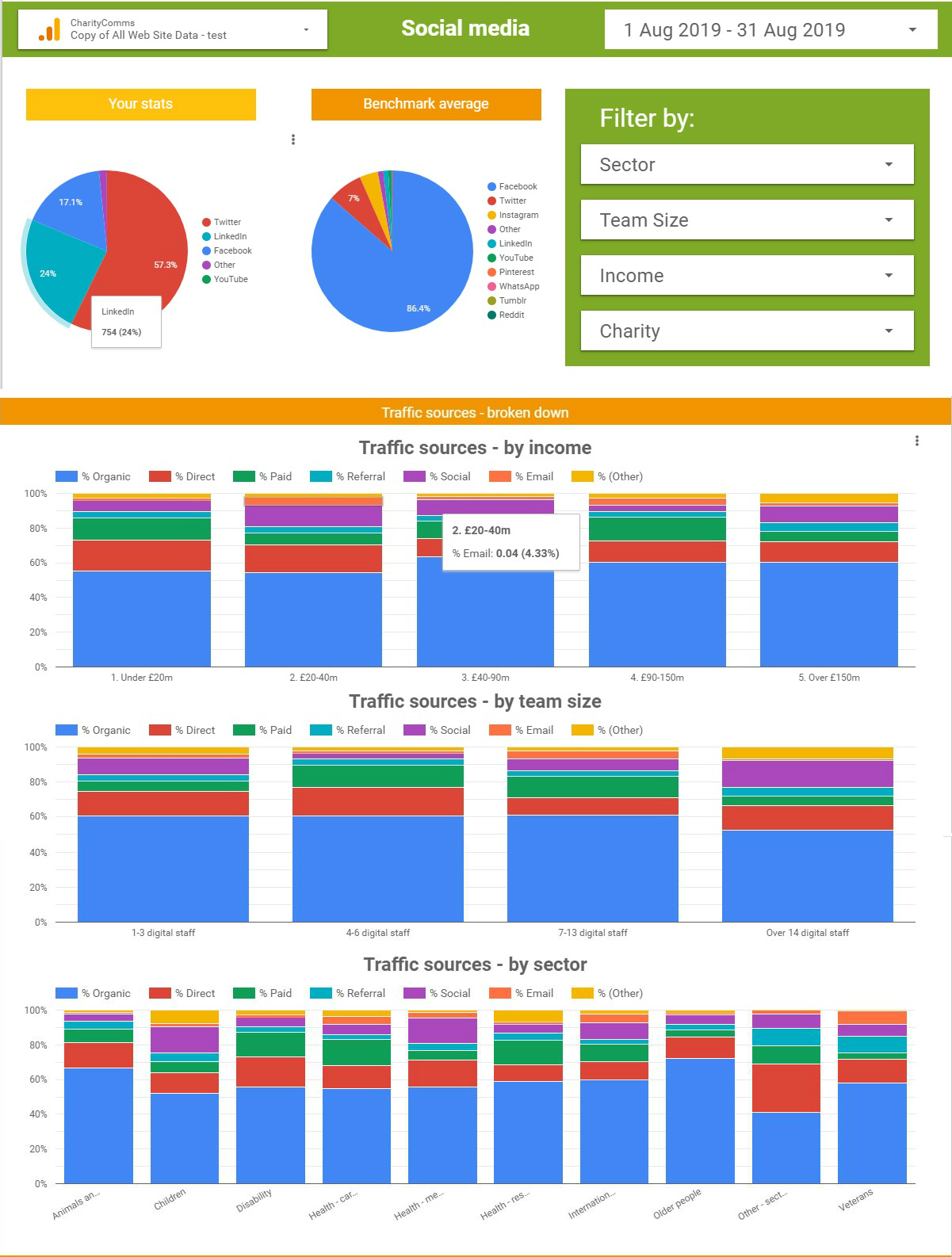
“I love the filters. I think this has made the report a much more valuable insight into how we should be performing for an organisation of our size/income/sector and allows us to benchmark accurately.”

Gathering feedback and insights
Each year we conduct a survey among the charities involved in the benchmark to assess progress and see how else we can improve the service. Last year, we found that 56% of participants have e-commerce in place so we have trialled a new e-commerce section of the dashboard. This has been received well and we are now looking at further roll out and how it can be used to improve KPIs and inform strategy.
During the year we also created a new Slack channel to allow participants to send through feedback, ideas and insights so it will act as a peer network, feedback mechanism and engagement building tool.
Where digital sits
Survey data showed most digital teams continue to sit within mar/comms (68%) with an increase in those listing “other” with a “hybrid” structure to 20%.
- comms / marketing 68%
- fundraising 7%
- own directorate 5%
- other 20%
Online donations
The average income from online donations is 12.9% (the median is 5%). 70% of members are using banner ads, while just 6% are using crowdfunding.
- direct ask 79%
- banner ads 70%
- Google ad grant 70%
- crowd funding 6%
- tribute funds 26%
- display retargeting 49%
Social fundraising
Facebook, Twitter and Instagram are the top three channels for organic fundraising asks.
- Facebook page 68%
- Twitter account 57%
- Instagram posts 57%
- LinkedIn page 30%
- YouTube channel 26%
- affiliate and referral programmes 9%
Social media (paid)
Instagram is now the second most used channel for paid advertising with 40% of members buying sponsored posts (behind Facebook ads which is used by 72%).
- Facebook advertising 72%
- sponsored Instagram posts 40%
- promoted tweets 28%
- YouTube ads 15%
- LinkedIn paid advertising 9%
“Definitely worthwhile. Great way of setting realistic KPIs and targets by benchmarking performance against other participating charities.”
Thank you!
We would like to thank digital marketing agency, upriseUP, and digital expert, Bertie Bosrédon, for their invaluable advice and assistance with the benchmark so that we can provide the best possible product for participating charities. We would also like to thank Duncan Hatfield, who contributed a huge amount to the Digital Benchmark and left CharityComms during 2018 – 2019.

Duncan Hatfield
former project manager
Duncan was with CharityComms for more than three years and worked on our Digital Benchmark as well as many other special projects and initiatives. He is currently studying Public and Social Policy at the University of Leeds.
Section 13
Building trust in charities
The positive impact of #YouMadeItHappen
Celebrating charity successes
CharityComms was a lead partner in the social media burst to promote the positive impact of the sector – celebrating charity successes and thanking supporters.
Using the hashtag: #YouMadeItHappen we generated nearly 4,000 unique tweets and 10,000 retweets, leading to total exposure of 5.4 million. This campaign was run in collaboration with NCVO, ACEVO, IoF, CAF, the Small Charities Coalition and the social media agency Lightful.
Proactively promoting our sector
We continue to monitor public trust and ways we can proactively promote the overarching narrative about the benefit and impact of the sector as a whole as well as tracking the media debate and supporting charities manage reputation risk.
Section 14
Report of the trustees
Structure, governance, management and financial activities for 2018 – 2019

Joseph Fadahunsi
Finance and governance manager
Joseph leads, delivers and develops the finance and governance management functions at CharityComms.
Our trustees
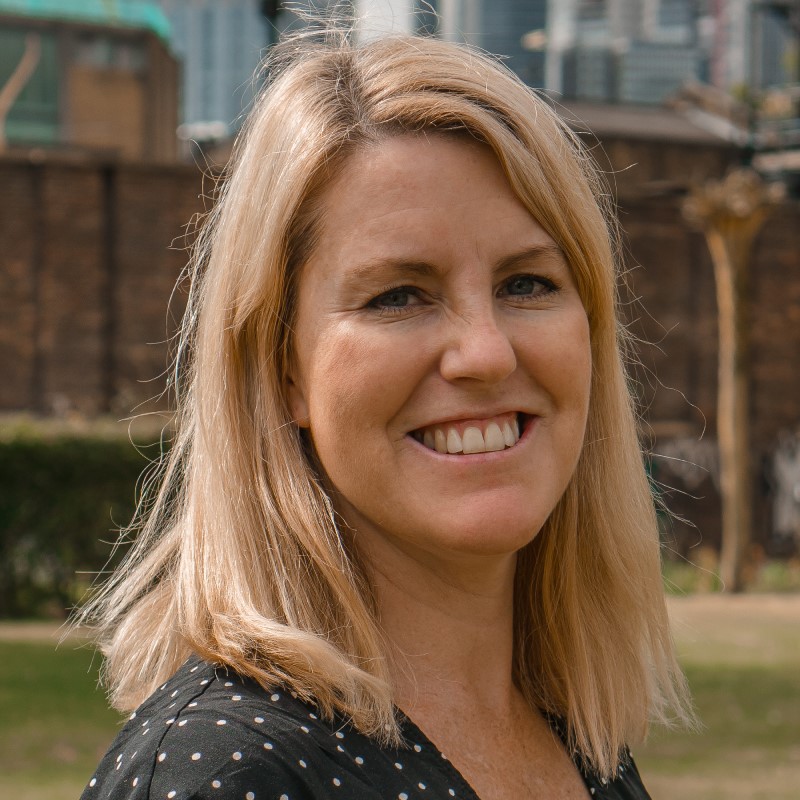
Kirsty Marrins
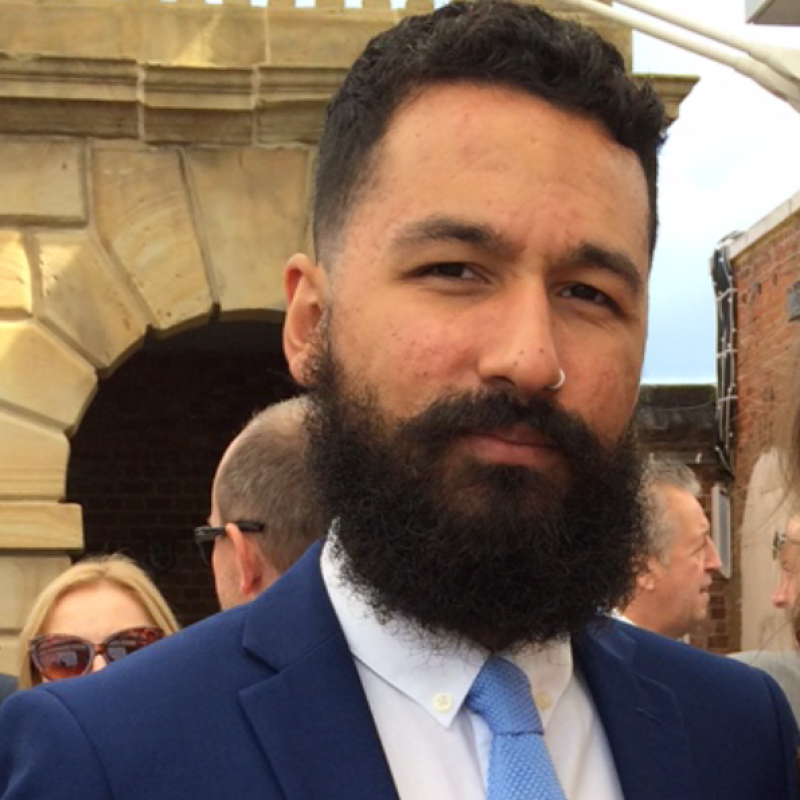
CJ Marshall

Mark Russell
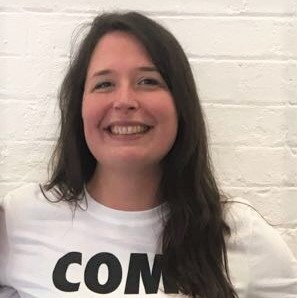
Lucy Devine

Stephen Critoph
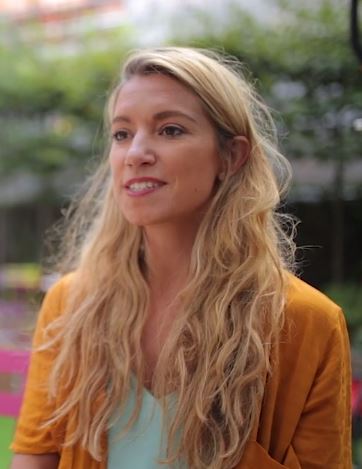
Chrystyna Chymera-Holloway

Pippa Gardner

Jessica Abelscroft

Justin Driskill

Katherine Hall
Financial review
Financial position
The accounts report another successful year for the charitable company with net income of £51,000. Turnover grew by 20% with the costs of services delivery being held at the same levels as the previous year, in proportion (direct costs 26%, indirect costs 67%) resulting in a 7% growth in net income year on year.
The increase in net income is an addition to our unrestricted reserves at the end of the year of £367,000 and a combined cash and bank balances of £477,000. The liquidity position of the charitable company is strong with its current assets covering its total liabilities by a ratio 2:1.
Reserves policy
The charitable company revised its reserves policy in the year to reflect the increase in staffing and activity levels from 5 to 6 months (estimated at £261,000). The total net assets of the charitable company are all classified as unrestricted reserves and stands at £367,000 at 30 April 2019. The reserves policy of the charity is therefore covered.
Going concern
The financial statements have been prepared on a going concern basis as the trustees believe that no material uncertainties exist. The trustees have considered the level of funds held and the expected level of income and expenditure for 12 months from authorising these financial statements. The budgeted income and expenditure is sufficient with the level of reserves for the charity to be able to continue as a going concern.
Risk management
The trustees have a risk management strategy which comprises:
- a quarterly review of the principal risks and uncertainties that the charity faces.
- the establishment of policies, systems and procedures to mitigate those risks identified in the risk register; and the implementation of procedures designed to minimise or manage any potential impact on the charity should those risks materialise.
This work has identified that financial sustainability is the major financial risk for the charity. A key element in the management of financial risk is a regular review of available liquid funds to settle debts as they fall due, regular liaison with the bank, and active management of trade debtors and creditors balances to ensure sufficient working capital by the Trust.
Further mitigation has involved the quarterly review of prepaid subscriptions of membership fees and events places to ensure that the receipts are accrued prudently as income deferred and thus provided for as current liabilities in the accounts.
Attention has also been focused on non-financial risks to ensure the health and safety of staff at work and delegates attending events.
These risks are managed by ensuring accreditation is up to date, having robust policies and procedures in place, and regular awareness training for staff working in these operational areas.
Structure, governance and management
Governance
The charity is controlled by its governing document, the memorandum and articles of association, and constitutes a limited company, limited by guarantee, as defined by the Companies Act 2006.
Working with the specialist consultancy Leading Governance all trustees attended a Board development workshop, we completed a comprehensive review of policies and practices, we are in the process of creating a Governance Manual, reviewed our governing documents and developed an action plan to support a culture of best practice and continuous improvement.
Changes to our trustee board
The following changes have been made to our trustee board during the year:
- Seamus O’Farrell stepped down as trustee, 15 October 2018
- John Grounds, stepped down as Chair, 1 March 2019
- Louise Dallmeyer stepped down as Treasurer, 1 March 2019
- Joseph Fadahunsi was appointed Company Secretary on 1 March 2019
- Mark J Russell was appointed as Trustee and Chair on 1 March 2019
- Stephen Critoph was appointed as Trustee and Treasurer on 1 March 2019
Decision making
The charity is run by the board of trustees, which sets and monitors strategy and policy. The board receives quarterly reports of all the activities of the charity. A minimum of three strategy meetings are held each year.
Induction and training of new trustees
New trustees receive an induction pack drawing information from the various Charity Commission publications signposted through the Commission’s guide “the Essential Trustee”.
Trustees receive the following governing documents: a work in progress governance manual, Memorandum and Articles and the latest financial statements, the organisational strategy and annual business plan, which cover:
- The obligations of trustees, the CEO and senior management team.
- The main documents which set out the operational framework for the charity including the Memorandum and Articles.
- Resourcing and the current financial position as set out in the latest published accounts.
- Future plans and objectives.
- Trustee training programme, including self-learning, external training and peer support to ensure high performance and continuous learning.
- Additionally, new trustees are invited and encouraged to proactively familiarise themselves with the charity and the context within which it operates.
Key management remuneration
The directors consider the board of directors, who are the charity’s trustees, and the senior management team comprise the key management personnel of the charity in charge of directing and controlling, running and operating the Trust on a day to day basis. All directors give of their time freely and no director received remuneration in the year. The pay of the senior staff is reviewed annually and normally increased in accordance with average earnings. In view of the nature of the charity, the directors benchmark against pay levels in other charities of a similar size.
Reference and administrative details
Registered company details
Registered Company number
06210121 (England and Wales)
Registered Charity number
1138312
Registered office
2-6 Tenter Ground
Spitalfields
London E1 7NH
Trustees
J A Grounds – resigned 1.3.19
Mrs L Dallmeyer – resigned 1.3.19
S O’Farrell – resigned 15.10.18
Ms J Ablescroft
H Leylabi
Ms K Hall
Ms L Devine
C Gardiner
C Chymera-Holloway
S Critoph (Treasurer) – appointed 1.3.19
M Russell (Chair) – appointed 1.3.19
Senior managers and company secretary
Senior Managers
Title: Chief Executive Officer
Name: A Warley
Appointment/Resignation: 20.2.17
Company Secretary
J O Fadahunsi
Independent examiner, bankers and legal advisers
Independent examiner
Galloways
30 New Road, Brighton
East Sussex BN1 1BN
Bankers
The Co-operative Bank PLC
Business Direct, PO Box 250
Skelmerdale
Lancashire WN8 6WT
Legal Advisers
Hempsons
100 Wood Street
London EC2V 7AN
Independent examiner's report to the trustees of CharityComms ('the Company')
I report to the charity trustees on my examination of the accounts of the Company for the year ended 30 April 2019.
Responsibilities and basis of report
As the charity’s trustees of the Company (and also its directors for the purposes of company law) you are responsible for the preparation of the accounts in accordance with the requirements of the Companies Act 2006 (‘the 2006 Act’).
Independent examiner's statement
Since your charity’s gross income exceeded £250,000 your examiner must be a member of a listed body. I can confirm that I am qualified to undertake the examination because I am a registered member of which is one of the listed bodies.
I have completed my examination. I confirm that no matters have come to my attention in connection with the examination giving me cause to believe:
- accounting records were not kept in respect of the Company as required by section 386 of the 2006 Act; or
- the accounts do not accord with those records; or
- the accounts do not comply with the accounting requirements of section 396 of the 2006 Act other than any requirement that the accounts give a true and fair view which is not a matter considered as part of an independent examination; or
- the accounts have not been prepared in accordance with the methods and principles of the Statement of Recommended Practice for accounting and reporting by charities [applicable to charities preparing their accounts in accordance with the Financial Reporting Standard applicable in the UK and Republic of Ireland (FRS 102)].
I have no concerns and have come across no other matters in connection with the examination to which attention should be drawn in this report in order to enable a proper understanding of the accounts to be reached.
Roger Moore FCA
Galloways
30 New Road
Brighton
East Sussex
BN1 1BN
Financial activities
Statement of financial activities
| Notes | 2019 unrestricted fund | 2018 total funds |
|
Income and endowments from |
|||
| Donations and legacies | 2 | £18,789 | £11,999 |
| Charitable activities | 5 | £718,446 | £600,057 |
| Other trading activities | 3 | £54,280 | £50,031 |
| Investment income | 4 | £1,811 | £1,262 |
| Total | £793,326 | £663,349 | |
Expenditure on |
|||
| Raising funds | |||
| Other trading activities | 6 | £17,770 | £11,539 |
| Charitable activities | 7 | £724,186 | £591,682 |
| Total | £741,956 | £603,221 | |
Net income |
£51,370 | £60,128 | |
Reconciliation of funds |
|||
| Total funds brought forward | £315,089 | £254,961 | |
Total funds carried forward |
£366,459 | £315,089 |
Balance sheet
| Notes | 2019 unrestricted fund | 2018 total funds |
|
Fixed assets |
|||
| Tangible assets | 14 | £14,323 | £15,118 |
Current assets |
|||
| Debtors | 15 | £217,631 | £94,110 |
| Cash at bank and in hand | £476,727 | £508,265 | |
| £694,358 | £602,375 | ||
Creditors |
|||
| Amounts falling due within one year | 16 | (£57,363) | (£51,266) |
Net current assets |
£636,995 | £551,109 | |
Total assets less current liabilities |
£651,318 | £566,227 | |
Accruals and deferred income |
17 | (£284,859) | (£251,138) |
Net assets |
£366,459 | £315,089 | |
Funds |
18 | ||
| Unrestricted funds | £366,459 | £315,089 | |
Total funds |
366,459 | 315,089 |
Balance sheet - continued
The charitable company is entitled to exemption from audit under Section 477 of the Companies Act 2006 for the year ended 30 April 2019.
The members have not required the company to obtain an audit of its financial statements for the year ended 30 April 2019 in accordance with Section 476 of the Companies Act 2006.
The trustees acknowledge their responsibilities for (a) ensuring that the charitable company keeps accounting records that comply with Sections 386 and 387 of the Companies Act 2006 and (b) preparing financial statements which give a true and fair view of the state of affairs of the charitable company as at the end of each financial year and of its surplus or deficit for each financial year in accordance with the requirements of Sections 394 and 395 and which otherwise comply with the requirements of the Companies Act 2006 relating to financial statements, so far as applicable to the charitable company.
Cash flow statement
| Notes | 2019 | 2018 as related | |
| Cash flows from operating activities: | |||
| Cash generated from operations | 1 | (£29,860) | £44,531 |
| Net cash provided by (used in) operating activities | (£29,860) | £44,531 | |
| Cash flows from investing activities: | |||
| Purchase of tangible fixed assets | (£3,489) | (£5,975) | |
| Interest received | £1,811 | £1,262 | |
| Net cash provided by (used in) investing activities | (£1,678) | (£4,713) | |
| Change in cash and cash equivalents in the reporting period | (£31,538) | £39,818 | |
| Cash and cash equivalents at the beginning of the reporting period | £508,265 | £468,447 | |
| Cash and cash equivalents at the end of the reporting period | £476,727 | £508,265 | |
Notes to the cash flow statement
1. Reconciliation of net income to net cash flow from operating activities
| 2019 | 2018 as related | |
| Net income for the reporting period (as per the statement of financial activities) | £51,370 | £60,128 |
| Adjustments for: | ||
| Depreciation charge | £4,284 | £5,040 |
| Interest received | (£1,811) | (£1,262) |
| Increase in debtors | (£123,521) | (£30,798) |
| Increase in creditors | £39,818 | £11,423 |
| Net cash provided by (used in) operating activities | (£29,860) | £44,531 |
Notes to the financial statements
1. Accounting policies
Basis of preparing the financial statements
The financial statements of the charitable company, which is a public benefit entity under FRS 102, have been prepared in accordance with the Charities SORP (FRS 102) ‘Accounting and Reporting by Charities: Statement of Recommended Practice applicable to charities preparing their accounts in accordance with the Financial Reporting Standard applicable in the UK and Republic of Ireland (FRS 102) (effective 1 January 2015)’, Financial Reporting Standard 102 ‘The Financial Reporting Standard applicable in the UK and Republic of Ireland’ and the Companies Act 2006. The financial statements have been prepared under the historical cost convention.
Income
All income is recognised in the Statement of Financial Activities once the charity has entitlement to the funds, it is probable that the income will be received and the amount can be measured reliably.
Donated facilities are included at the value to the charity where this can be quantified and a third party is bearing the cost. No amounts are included in the financial statements for services donated by volunteers.
Membership income is recognised in the period to which it relates.
Event income is recognised when the conference takes place.
Expenditure
Liabilities are recognised as expenditure as soon as there is a legal or constructive obligation committing the charity to that expenditure, it is probable that a transfer of economic benefits will be required in settlement and the amount of the obligation can be measured reliably. Expenditure is accounted for on an accruals basis and has been classified under headings that aggregate all cost related to the category. Where costs cannot be directly attributed to particular headings they have been allocated to activities on a basis consistent with the use of resources.
Fund-raising costs are those incurred in seeking voluntary contributions and do not include the costs of disseminating information in support of the charitable activities.
Governance costs
Included in governance costs are the costs associated with the governance arrangements of the charity. Costs include independent examination, legal advice for trustees and costs associated with constitutional and statutory requirements.
Allocation and apportionment of costs
Support and governance costs are recharged to charitable activities based on estimated usage, dependent on the type of expenditure.
Tangible fixed assets
Depreciation is provided at the following annual rates in order to write off the cost less estimated residual value of each asset over its estimated useful life.
Computer equipment – 25% on reducing balance
Website – 25% on reducing balance
Taxation
The charity is exempt from corporation tax on its charitable activities.
Fund accounting
Unrestricted funds can be used in accordance with the charitable objectives at the discretion of the trustees.
Restricted funds can only be used for particular restricted purposes within the objects of the charity. Restrictions arise when specified by the donor or when funds are raised for particular restricted purposes.
Further explanation of the nature and purpose of each fund is included in the notes to the financial statements.
Pension costs and other post-retirement benefits
The charitable company operates a defined contribution pension scheme. Contributions payable to the charitable company’s pension scheme are charged to the Statement of Financial Activities in the period to which they relate.
Termination benefits
Termination benefits are recognised immediately as an expense when the charity is demonstrably committed to terminate the employment of an employee or to provide termination benefits.
Debtors and creditors receivable/ payable within one year
Debtors and creditors with no stated interest rate and receivable or payable within one year are recorded at transaction price. Any losses arising from impairment are recognised in expenditure.
2. Donations and legacies
| 2019 | 2018 as restated | ||
| Donations | £18,789 | £11,999 |
3. Other trading activities
| 2019 | 2018 as restated | ||
| Sponsorships | £54,280 | £50,031 |
4. Investment income
| 2019 | 2018 as restated | ||
| Deposit account interest | £1,811 | £1,262 |
5. Income from charitable activities
| 2019 | 2018 as restated | ||
| Events | £252,396 | £179,795 | |
| Membership benefits and services |
£466,050 | £420,262 | |
| £718,446 | £600,057 |
6. Other trading activities
| 2019 | 2018 as restated | ||
| Purchases | £17,770 | £10,759 | |
| Bad debts | – | £780 | |
| £17,770 | £11,539 |
7. Charitable activities costs
| Direct costs | Support costs (See note 8) |
Totals | |
| Events | £358,664 | £68,797 | £427,461 |
| Membership benefits and services |
£222,715 | £74,010 | £296,725 |
| £581,379 | £142,807 | £724,186 |
8. Support costs
| Management | Finance | Information technology |
Other | Governance | Totals | |
| Events | £17,983 | £2,277 | £11,359 | £30,876 | £6,302 | £68,797 |
| Membership benefits & services |
£19,479 | £2,466 | £12,306 | £32,934 | £6,825 | 74,010 |
| £37,462 | £4,743 | 23,665 | £63,810 | £13,127 | £142,807 |
9. Net income/(expenditure)
Net income/(expenditure) is stated after charging/(crediting):
| 2019 | 2018 as restated | ||
| Depreciation – owned assets | £4,284 | £5,040 |
10. Independent examiner’s remuneration
| 2019 | 2018 as restated | ||
| Independent examiner’s remuneration | £2,250 | £2,000 | |
| Total non-audit fees | £2,250 | £2,000 |
11. Trustees’ remuneration and benefits
There were no trustees’ remuneration or other benefits for the year ended 30 April 2019 nor for the year ended 30 April 2018.
| 2019 | 2018 as restated | ||
| Trustees’ expenses | £522 | – |
12. Staff costs
| 2019 | 2018 as restated | ||
| Wages and salaries | £368,229 | £307,680 | |
| Social security costs | £33,998 | £27,726 | |
| Other pension costs | £10,854 | £9,111 | |
| £413,081 | £344,517 |
The average monthly number of employees during the year was as follows:
| 2019 | 2018 as restated | ||
| Staff | 11 | 12 |
No employees received emoluments in excess of £60,000.
Total redundancy / termination payments amount to £3,327 (2018: £nil) and are related to a statutory redundancy payment to staff.
13. Prior year adjustment
There has been a prior period adjustment to move amounts in income and expenditure to charitable activities. This has had no effect on the brought forward and carried forward funds.
14. Tangilble fixed assets
| Computer equipment | Website | Totals | |
Cost |
|||
| at 1 May 2018 | £6,024 | £52,339 | £58,363 |
| Additions | £3,489 | – | £3,489 |
| at 30 April 2019 | £4,951 | £42,578 | £47,529 |
Depreciation |
|||
| at 1 May 2018 | £3,921 | £39,324 | £43,245 |
| Charge for year | £1,030 | £3,254 | £4,284 |
| at 30 April 2019 | £4,951 | £42,578 | £47,529 |
Net book value |
|||
| At 30 April 2019 | £4,562 | £9,761 | £14,323 |
| At 30 April 2018 | £2,103 | £13,015 | £15,118 |
15. Debtors: amounts falling due within one year
| 2019 | 2018 as restated | ||
| Trade debtors | £194,962 | £87,466 | |
| Other debtors | – | £4,566 | |
| Prepayments and accrued income | £22,669 | £2,078 | |
| £217,631 | £94,110 |
16. Creditors: acounts falling due within one year
| 2019 | 2018 as restated | ||
| Trade creditors | £19,625 | £11,882 | |
| Social security and other taxes | £7,417 | – | |
| VAT | £25,126 | £31,683 | |
| Other creditors | £2,945 | £5,701 | |
| Accrued expenses | £2,250 | £2,000 | |
| £57,363 | £51,266 |
17. Accruals and deferred income
Membership income is invoiced annually and recognised in the period to which it relates. Deferred income in relation to membership fees total £254,289 (2018: £226,738).
Also included in deferred income are amounts of £26,570 (2018:£24,401) which relate to events that had not taken place before the year-end.
18. Movement in funds
| at 1.5.18 | Net movement in fundx | at 30.4.19 | |
| Unrestricted funds | |||
| General fund | £315,089 | £51,370 | £366,459 |
| Total funds | £315,089 | £51,370 | £366,459 |
Net movement in funds, included in the above are as follows:
| Incoming resources | Resources expended | Movement in funds | |
| Unrestricted funds | |||
| General fund | £793,326 | (£741,956) | £51,370 |
| Total funds | £793,326 | (£741,956) | £51,370 |
Comparatives for movement in funds
| at 1.5.17 | Net movement in fundx | at 30.4.18 | |
| Unrestricted funds | |||
| General fund | £254,961 | £60,128 | £315,089 |
| Total funds | £254,961 | £60,128 | £315,089 |
Comparative net movement in funds, included in the above are as follows:
| Incoming resources | Resources expended | Movement in funds | |
| Unrestricted funds | |||
| General fund | £663,349 | (£603,221) | £60,128 |
| Total funds | £663,349 | (£603,221) | £60,128 |
A current year 12 months and prior year 12 months combined position is as follows:
| at 1.5.17 | Net movement in fundx | at 30.4.19 | |
| Unrestricted funds | |||
| General fund | £254,961 | £111,498 | £366,459 |
| Total funds | £254,961 | £111,498 | £366,459 |
A current year 12 months and prior year 12 months combined net movement in funds, included in the above are as follows:
| Incoming resources | Resources expended | Movement in funds | |
| Unrestricted funds | |||
| General fund | £1,456,675 | (£1,345,177) | £111,498 |
| Total funds | £1,456,675 | (£1,345,177) | £111,498 |
19. Related party disclosures
There were no related party transactions for the year ended 30 April 2019.
Thank you!
We’d like to say thank you to our trustees, Louisa, John and Seamus who stepped down from the board during 2018 – 2019, as well as Hanif and Clive who stepped down at our AGM in November 2019.

Louisa Dallmeyer

John Grounds

Seamus O'Farrell

Hanif Leylabi
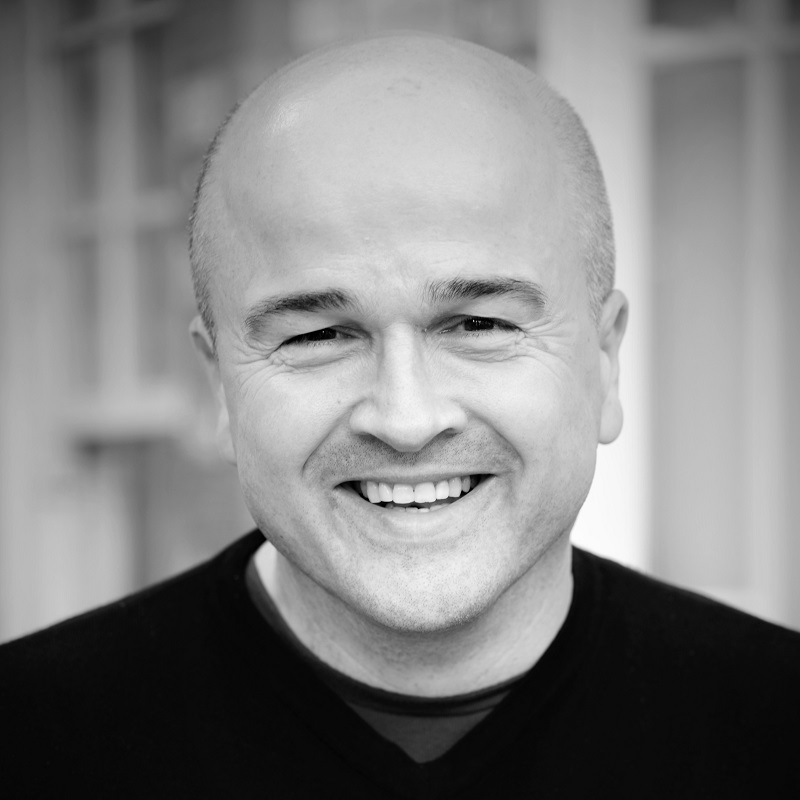
Clive Gardiner
Section 15
Development activities 2019/20
Our focus for the year
Building and investing
Building on our strong financial performance over the past few years, CharityComms is investing some of our reserves back into our products and services.
Membership services improvement
Development of CRM (Salesforce), creating a member portal, data cleansing and systems integration (between finance systems, CRM and website).
Best practice governance
Implementation of the Governance review recommendations, including improvement of finance procedures, controls and reporting and HR policies.
Improving access and UX
Developing and testing website specialist hubs to support a learning approach, continuous improvement, cross-purpose content and improve accessibility and usability.





